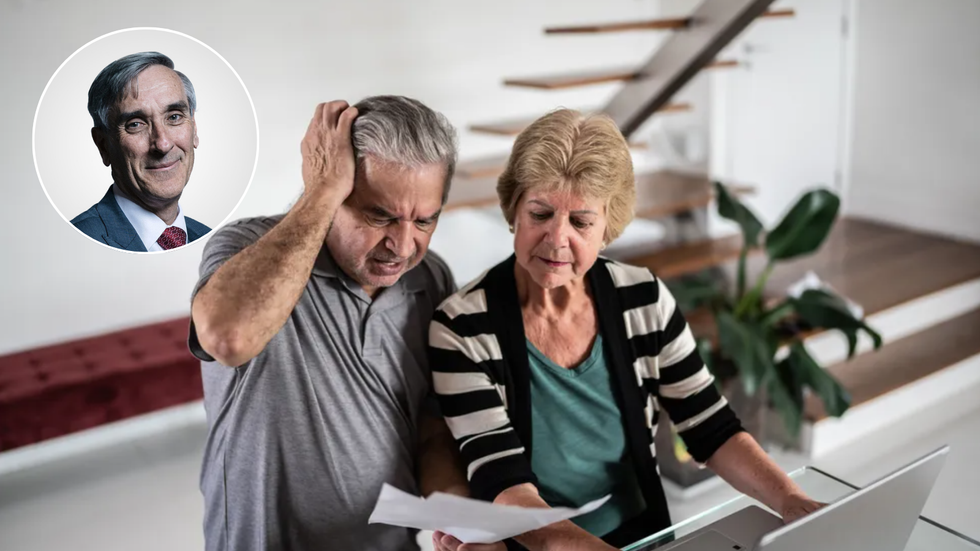Rachel Reeves has inferred tax rises and benefit cuts coming
GBNEWS
Inheritance tax brought in £736m for the Chancellor last month alone, according to the Office for National Statistics (ONS)
Don't Miss
Most Read
Trending on GB News
Pension savers in the UK could face a potential 'double tax' hit on their retirement savings, as speculation mounts over changes to inheritance tax rules in the upcoming Budget.
Currently, pensions are not included in the assets that count towards inheritance tax, making them a popular tool for inheritance planning.
However, this generous treatment may be set to change on October 30, with the Government considering options to make pension assets liable for inheritance tax or levying a charge on them at death.
Such changes could significantly impact how people manage their pension savings and plan for their beneficiaries' futures.
Experts warn that the reforms might lead to a rise in gifting and greater use of trusts and insurance products as individuals seek alternative ways to pass on their wealth.
Under current rules, pensions are treated generously by the taxman when people die, especially before age 75. Beneficiaries of most defined contribution pension pots pay no tax if the owner dies before 75, subject to certain limits and time constraints.
 "The government could make the rules tougher over passing on pension assets that survive a pensioner," says John Redwood GB News/ Getty
"The government could make the rules tougher over passing on pension assets that survive a pensioner," says John Redwood GB News/ GettyFor deaths after 75, beneficiaries pay their normal income tax rate on withdrawals. This favourable treatment has led many to use pensions as part of inheritance tax planning, often spending them last, if at all.
Matthew Parden, financial advisor and CEO at Marygold & Co.(UK), told GB News: "If someone dies before the age of 75, their pension is passed on tax-free. However, after 75, the recipient could face a 45 per cent tax."
With the Chancellor facing a £22bn debt in the public finances, there has been much speculation on how she plans to fill this hole and grow the economy.
Sarah Coles, the head of personal finance at Hargreaves Lansdown, said: “Even if the Government makes no changes at all, we’ll continue to face ever-higher tax bills, thanks to frozen income tax and inheritance tax thresholds and a slashing of the capital gains tax and dividend tax allowances.
“And Rachel Reeves has no intention of leaving things there. The need for more cash to fill the black hole in the Government’s finances could push up any of these taxes.”
Charlotte Ransom, chief executive of Netwealth, suggests the Government might cap the pension assets that can sit outside an estate on death. Alternatively, they could only allow tax-free passage to a spouse, as with other investments.
Helen Morrissey, head of retirement analysis at Hargreaves Lansdown, warned that changes to pensions could see families paying thousands more after a loved one dies.
She said: "A change could see the loved ones of a single child-free person with a home worth £300,000 and a pension worth £200,000 being slapped with a £70,000 bill when under current rules there would be no inheritance to pay."
Such changes could create a "double tax" situation for some beneficiaries, particularly if the pension holder dies after 75.
Parden explained how the double tax will occur, he said: "If you die aged 75 or above, the tax-free options are not available to whoever you have left it to, so any anything they cash in is treated as their income and is subject to their marginal rate of income tax - back to whatever their earnings are in any particular tax year.
"So, if the pot was £1 million, depending on your existing earnings, you could pay close to £450,000 in income tax if you took it all in one go (netting about £550,000).
"It’s still been received from an estate free of inheritance tax, but you can see if inheritance tax was charged on the estate, it would seem a little unfair to be subject to a 45 per cent income tax charge on top of the 40 per cent inheritance tax already suffered on assets including the pension pot."
The CEO warned about the complexity of potential changes, noting that meddling with tax legislation often brings "unintended consequences" and that people might alter their behaviour to legitimately avoid tax if changes are implemented.
He emphasised the need for fairness in any potential reforms. He said: "Any reform that subjects pensions to IHT should aim for fairness by taxing only once, possibly through adjustments to income tax treatment."
Jordan Gillies, tax expert at Saltus, suggests that changes could reverse the recent trend of increasing pension contributions following the scrapping of the lifetime allowance.
LATEST DEVELOPMENTS:
He predicted that many might turn to options like nil rate band trusts instead, and many are more likely to spend their pensions during their lifetime rather than preserving them for inheritance.
He also anticipates a potential increase in gifting levels, which could ultimately reduce Treasury revenue.
Charlotte Ransom of Netwealth notes that some individuals are already opting to take 25 per cent tax-free lump sums ahead of the Budget. Any reduction in tax-free pension benefits could result in smaller retirement pots overall.
Gillies suggested that families explore alternative options like insurance products for inheritance planning if traditional methods become less tax-efficient.
Ultimately, these changes may reshape how Britons approach retirement savings and inheritance planning, potentially altering the financial landscape for generations to come.







